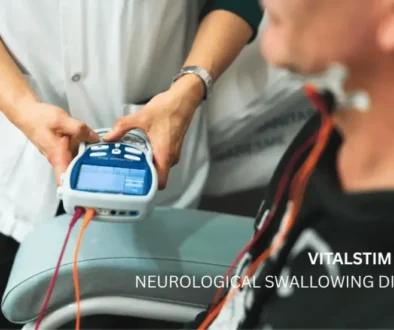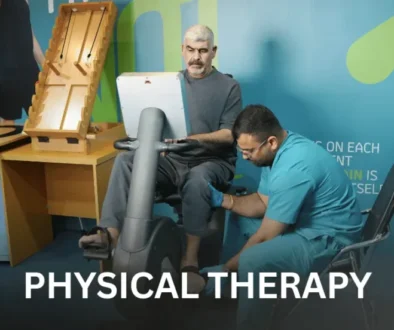Common Causes of Aphasia and Its Impact on the Brain
Aphasia is a language disorder that disrupts an individual’s communication. This may happen in various aspects of communication, including speaking, reading, writing, and comprehension. It is crucial to understand the common causes of aphasia in providing overall treatment plans that promote improvement and enhance the quality of life at Kent Healthcare in Dubai. With our experienced professionals delivering Speech Therapy, Occupational Therapy, Physiotherapy, Psychology, Behaviour Therapy, and Audiology, we endeavor to help patients with aphasia through personalized rehabilitation programs.

What is Aphasia?
Aphasia is a complex disorder because of brain injury in the brain regions that are in charge of language, typically on the left side. Aphasia incapacitates the brain to process language, as it impacts speaking, comprehension, reading, and writing. Aphasia can be very different in its severity—some individuals have only minimal difficulty producing words, whereas others have no ability to speak.
Aphasia is not the result of reduced intelligence or loss of mental abilities, but as an interference with the highly complex brain systems that control language. Aphasic patients can have good thinking and can understand most of what they are spoken to, but they can’t talk and get information conveyed by either reading or talking appropriately.
The Role of Speech Therapy in Managing Stuttering
The language processing by the brain is a process that involves multiple regions that are interlinked and contribute to the different components of communication:
-
Broca’s Area: Located in the frontal lobe, this area is essential for speech production and articulation. Damage to Broca’s area typically results in non-fluent aphasia, where speech is slow and effortful.
-
Wernicke’s Area: Situated in the temporal lobe, Wernicke’s area plays a critical role in language comprehension. Damage to this region leads to fluent aphasia, characterized by the production of nonsensical or jumbled speech despite a normal flow of words.
-
Arcuate Fasciculus: This bundle of nerve fibers connects Broca’s and Wernicke’s areas, enabling the coordination of speech repetition and language processing.
Common Causes of Aphasia
1. Stroke
Strokes are the most common cause of aphasia and occur in around 25-40% of cases. Strokes are formed when a blood supply vessel going to the brain is either blocked (ischemic stroke) or ruptures (hemorrhagic stroke) and cells in the region perish. When strokes occur in brain locations that are involved in language processing, the damage caused by the strokes can disable the brain from creating or interpreting language.
The impact of a stroke on language abilities depends on the location and extent of the damage. For instance, strokes to Broca’s area typically result in non-fluent aphasia, while damage to Wernicke’s area tends to result in fluent aphasia.
2. Traumatic Brain Injury (TBI)
Traumatic Brain Injury (TBI) caused by accidents, falls, sports-related injuries, or violent attacks may also cause aphasia. Unlike strokes, which are generally associated with focal damage to a specific brain area, TBIs often cause diffuse damage to multiple areas of the brain simultaneously. This can lead to complex patterns of aphasia in which speech production, comprehension, and cognition are all impaired to varying degrees.
Severity of TBI aphasia depends on the location and degree of injury. Aphasia in some individuals may be transient, but in others, it may be permanent and lead to lifelong communication disorders.
3. Brain Tumors
Brain tumors occurring in or near language-processing parts of the brain can cause aphasia. The symptoms can take place gradually as the tumor grows and disrupts normal brain functioning. Symptoms can suddenly appear if a tumor causes a hemorrhage or places tremendous pressure on tissue around it.
Treatment of tumor-induced aphasia most often involves surgical excision, chemotherapy, radiation, and speech-language therapy. Early detection and treatment are vital in order to optimize the outcomes of communication.
4. Infections and Brain Inflammation
Certain infections will cause inflammation or damage to the brain tissue and produce aphasia. Encephalitis caused by herpesviruses, meningitis, and other infections of the brain can damage the language centers either directly or indirectly by inducing swelling and increased intracranial pressure.
Though healing is possible through proper medical treatment, residual signs and symptoms persist. Speech-language therapy is also often required during the rehabilitation process of individuals in order to regain communication skills after a brain injury due to an infection.
5. Progressive Neurological Disorders
Alzheimer’s disease and Primary Progressive Aphasia (PPA) increasingly impair language abilities over the course of many years. PPA is a progressive, unusual disorder that targets language networks within the brain specifically, leading to gradual loss of communication skills.
Unlike other forms of aphasia, whose cause is typically instantaneous trauma, progressive neurological illnesses cause insidious deterioration of language. Individuals with PPA might first experience word-finding difficulty but subsequently have trouble building a coherent sentence or tracking speech.
6. Other Causes
Temporary aphasia can be caused by seizures, migraines, or Transient Ischemic Attacks (TIAs). While most individuals fully recover from such an attack, repeated attacks can lead to long-term damage and difficulty with communication.
How Aphasia Impacts the Brain
Damage to Language Zones
When disease or trauma disrupts Broca’s or Wernicke’s areas, individuals develop different types of aphasia:
-
Non-fluent Aphasia (Broca’s Aphasia): Speech is slow, labored, and grammatically simplified. However, comprehension may remain relatively intact.
-
Fluent Aphasia (Wernicke’s Aphasia): Speech production is smooth and fluent, but words may be nonsensical or misplaced, and comprehension is significantly impaired.
Cognitive Impairments
Aphasia often coexists with other cognitive impairments, such as difficulties with memory, attention, and executive functions. These challenges can further complicate speech comprehension, reading, and writing.
Emotional and Psychological Effects
Living with aphasia can be incredibly frustrating and isolating. Individuals may experience anxiety, depression, and social withdrawal due to their communication difficulties. Providing emotional support and integrating psychological services into rehabilitation can significantly enhance recovery.
Diagnosing Aphasia
At Kent Healthcare, accurate diagnosis is essential for developing effective treatment plans. Our team of speech-language pathologists utilizes a range of diagnostic tools to determine the type and severity of aphasia:
-
Neuroimaging: MRI, CT scans, and other technologies to visualize areas of brain damage.
-
Language Tests: Comprehensive evaluations of comprehension, speech production, reading, and writing.
-
Cognitive Assessments: Identifying related impairments affecting language processing.
Treatment Options for Aphasia
Kent Healthcare offers a multidisciplinary approach to aphasia treatment, combining:
-
Speech and Language Therapy: Personalized therapy plans designed to improve speech, comprehension, reading, and writing.
-
Technological Aids: Tools to enhance communication, including apps and specialized software.
-
Collaborative Care: Coordinated efforts involving psychologists, occupational therapists, physiotherapists, and behavior therapists.
-
Rehabilitation Plans: Tailored programs aimed at achieving optimal recovery and improved quality of life.
Understanding the common causes of aphasia and how it affects the brain is essential for effective treatment. At Kent Healthcare, we are committed to providing compassionate, individualized care through a multidisciplinary approach. By combining expertise across various fields, we ensure the best possible outcomes for our patients, promoting recovery and enhancing quality of life.
Book an appointment
Booking an appointment with our team of professionals is just a few taps away. Book now!


